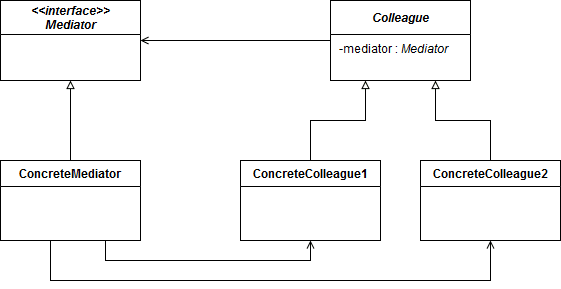Mediator Pattern is a behavioral design pattern that reduce chaotic dependencies between objects. This is achieved by creating a mediator object that takes care of the interaction between dependent objects. Consequently, all the communication goes through the mediator.
Intent
- Define an object that encapsulates how a set of objects interact.
- Promotes loose coupling by keeping objects from referring to each other explicitly, and it lets you vary their interaction independently.
- Design an intermediary to decouple many peers.
- Mediator helps to facilitate the interaction between objects in a manner in that objects are not aware of the existence of other objects.
Implementation
This pattern defines a Mediator object that encapsulates the interaction between a set of objects. Following are the participants:
- Mediator : Defines the interface for communication between Colleague objects
- Colleague : Defines the interface for communication with other Colleagues through its Mediator
- ConcreteMediator : Coordinates communication between Colleague
- ConcreteColleague : Communicates with other Colleagues through its Mediator

Example
Below example is simulating a chat application where users can send messages to other users in one to one fashion.
// Mediator Interface
public interface Mediator
{
public void sendMessage(String msg, int userId);
void addColleague(User user);
}
// Concrete Mediator
public class ChatRoom implements Mediator {
private Map<Integer, User> mUsers = new HashMap<>();
@Override
public void sendMessage(String msg, int userId)
{
User u = mUsers.get(userId);
u.receive(msg);
}
@Override
public void addColleague(User user) {
mUsers.put(user.getId(), user);
}
}
// Colleague Class
public abstract class User
{
private Mediator mediator;
private int id;
private String name;
public User(Mediator room, int i, String nm){
mediator = room;
name = nm;
id = i;
}
public abstract void send(String msg, int userId);
public abstract void receive(String msg);
public Mediator getMediator() {
return mediator;
}
public String getId() {
return id;
}
public String getName() {
return name;
}
}
// Concrete Colleagues
public class ChatUser extends User {
public ChatUser(Mediator room, int id, String name) {
super(room, id, name);
}
@Override
public void send(String msg, int userId) {
System.out.println(getName() + " :: Sending Message : " + msg);
getMediator().sendMessage(msg, userId);
}
@Override
public void receive(String msg) {
System.out.println(getName() + " :: Received Message : " + msg);
}
}
public class MediatorTest
{
public static void main(String[] args)
{
Mediator chatroom = new ChatRoom();
User user1 = new ChatUser(chatroom,1, "AN");
User user2 = new ChatUser(chatroom,2, "BL");
User user3 = new ChatUser(chatroom,3, "CS");
chatroom.addColleague(user1);
chatroom.addColleague(user2);
chatroom.addColleague(user3);
chatroom.addColleague(user4);
user1.send("Hello", 2);
user2.send("Hey", 1);
}
}